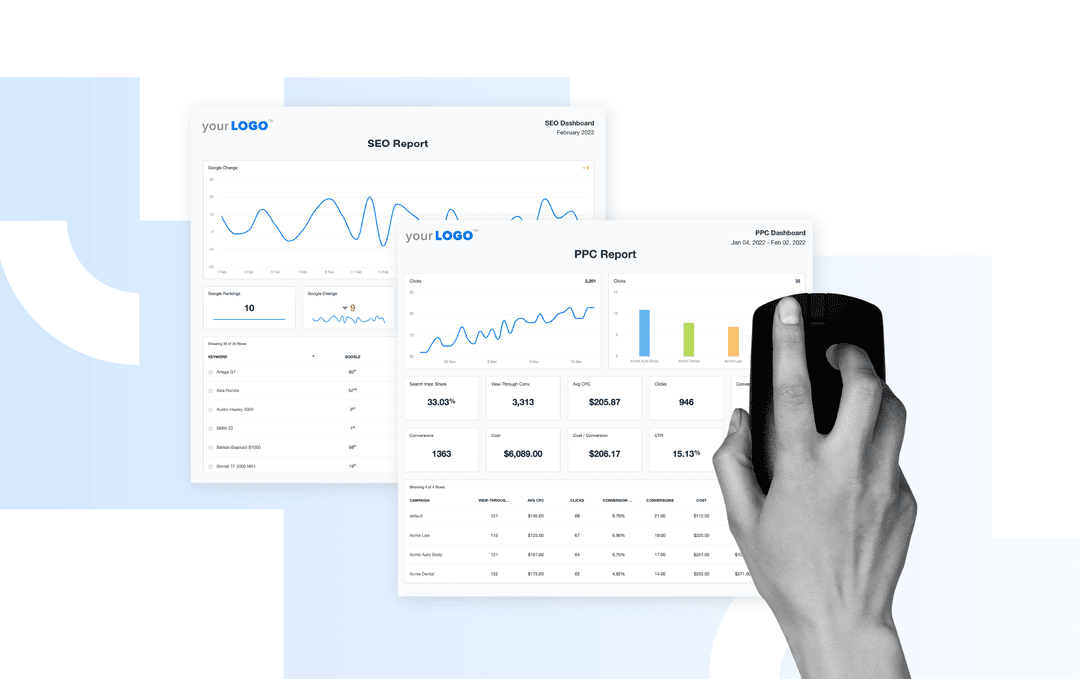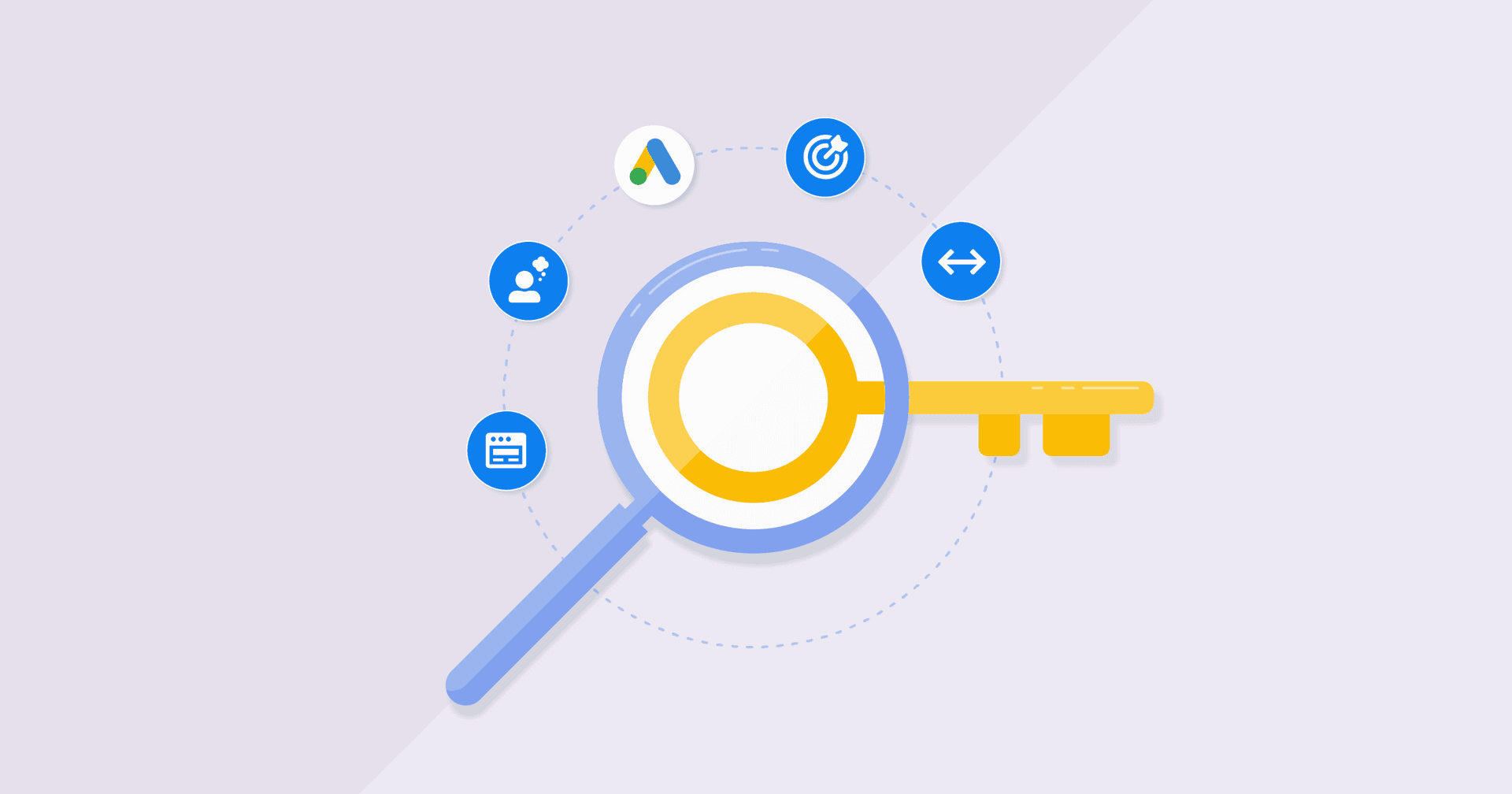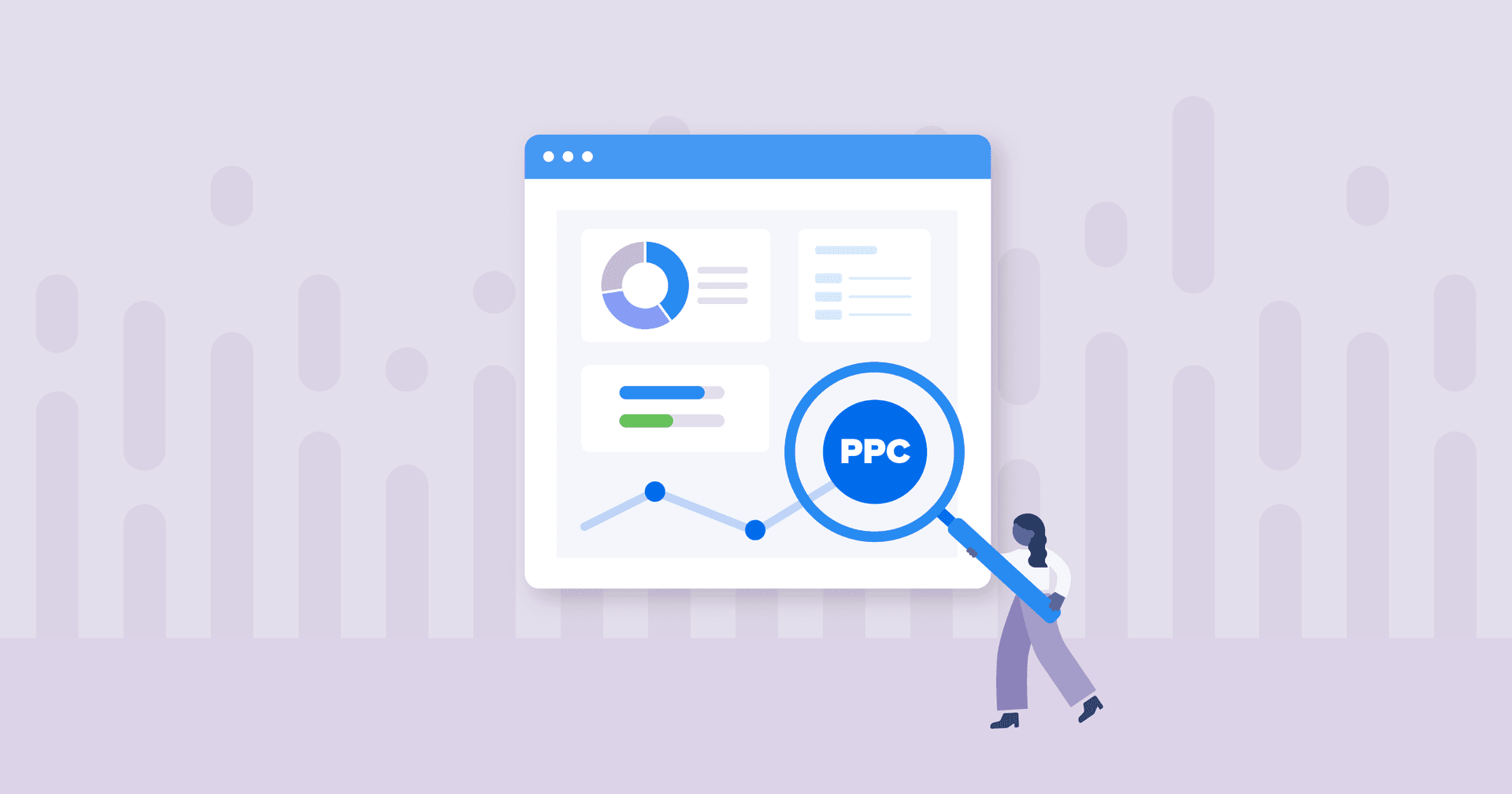Table of Contents
Table of Contents
- SEO: The driving force behind organic traffic
- PPC: The catalyst for immediate visibility
- The intersection of SEO and PPC in search engine marketing
- Interesting organic vs. paid search statistics
- SEO vs. PPC: Which is better?
- SEO and PPC: How they work together
- Summary: Integrating SEO and PPC data has never been more important
7,000+ agencies have ditched manual reports. You can too.
Free 14-Day TrialQUICK SUMMARY:
As AI transforms how search results are generated and displayed, the question of whether to focus on SEO or PPC has become even more complex. This article explores the latest roles of both channels, how they’re being used by agencies in 2025, and what to consider when deciding where to invest. From long-term visibility to instant traffic and smarter budget planning, you’ll get a clearer picture of how SEO and PPC fit into a modern search strategy.
Every few years, the SEO vs. PPC debate resurfaces. And with AI reshaping the search landscape, it’s louder—and more complicated—than ever.
Search engine results pages aren’t what they used to be. Between ads, AI-generated answers, local map packs, and shifting organic placements, SEO and PPC play very different roles today. SEO still delivers long-term visibility, but growing competition and AI-led summaries have led to fewer clicks, even for top-ranking pages.
Because of this, many agencies are relying more on PPC, which offers a greater degree of control and targeting precision. That said, rising costs, ad fatigue, and increased AI automation have made it harder to stand out, especially as more advertisers flood the space. And those paid ad placements are also losing visibility to AI-generated results.
So, the million-dollar questions remain: Should your agency focus on organic search or paid ads? Does it make sense to invest at all? After more than a decade in search marketing, I’ve seen this debate cycle through many forms. But even with so many recent changes, one thing stays the same—there’s value in a dual-channel approach. The key is knowing when to use each, how they complement one another, and where they fit into your clients’ broader digital marketing strategy.
That’s exactly what this article explores. We’ll break down the strengths and challenges of both SEO and PPC, how they work together, real-world use cases, and how to decide where your client should invest next.
SEO: The driving force behind organic traffic
Search Engine Optimization (SEO) is one of the most effective ways to drive consistent, long-term traffic.
While it doesn’t deliver overnight results, SEO lays the foundation for sustainable growth by optimizing content, site structure, and user experience. When done well, SEO improves visibility in search engine results and keeps organic traffic flowing, even as AI changes how those results are displayed.
More specifically, here’s a breakdown of what SEO entails:
Keyword research: Identify the exact search keywords your client’s audience is using. This helps uncover intent, guide content direction, and highlight opportunities to outrank competitors.
Content creation: Keep your client’s website fresh and relevant by publishing high-quality, useful content that addresses what their audience wants to know. This improves engagement and sends positive signals to search engines.
On-page optimization: Optimize key elements—like titles, headers, meta descriptions, URLs, and body content—to include relevant keywords and improve clarity for both users and search engines.
Off-page SEO: Secure high-quality backlinks from reputable sources to build your client’s domain authority and reinforce trust in their site.
Technical SEO: Ensure your client’s site is fast, mobile-friendly, and easy for search engines to crawl and index. This includes improving site structure, page speed, and structured data.
Local SEO: If your client serves a local area, optimize for map listings and location-based searches by managing their Google Business Profile. Ensure NAP consistency, showcase reviews, and add high-quality photos.
AI & search evolution: To stay competitive, content should be structured for AI-driven features like rich snippets, summaries, and answer boxes. This includes using schema markup, clear hierarchical headings, concise answers, and FAQ-style formatting that directly addresses common queries.
SEO isn’t a one-and-done task; it’s an ongoing effort that strengthens over time. By investing in each of these elements, you’ll build a solid foundation for website visibility and long-term growth.
SEO pros and cons
While SEO comes with some standout benefits, there are also some drawbacks to consider–let’s explore further.
Pros | Cons |
|---|---|
After initial setup, organic traffic is free and scalable without ongoing ad spend. | It may take months to gain rankings and see meaningful traffic. Search engine updates can impact rankings without warning. |
Once SEO campaigns are running, there’s no need to turn them on or off (unlike PPC ads). | Requires specialized skillsets in content, technical optimization, and strategy. |
Cost-effective over time, especially for sustained traffic. | No guarantee of traffic, even with consistent effort. |
Delivers longer-lasting benefits than paid advertising once authority has been built. | Offers limited control over search engine algorithms and when content appears. |
Supports full-funnel visibility–possible to capture traffic from awareness to decision. | Typically has a lower conversion rate compared to paid search campaigns. |
Involves a smaller upfront investment than most paid search campaigns. | Difficult to scale quickly, especially for time-sensitive campaigns. |
Well-structured, informative content is more likely to surface in AI-driven results. | AI-powered SERPs and summaries may reduce click-through rates on traditional listings. |
While SEO is a powerful long-term strategy, it’s not without its challenges. Understanding both sides of the coin helps set realistic expectations and helps your agency build more effective marketing campaigns.
PPC: The catalyst for immediate visibility
Unlike SEO, which builds momentum over time, Pay-Per-Click (PPC) advertising delivers instant results. By bidding on targeted keywords, it’s easier to secure top placements on search engine results pages and drive traffic immediately. Every click sends a potential customer to the website, making PPC ideal for time-sensitive campaigns, product launches, or quick lead generation. Utilizing paid search analytics can help you determine what's working and what tweaks to make to achieve profitable quick-wins.
On a granular level, PPC involves:
Keyword research: Identify high-intent keywords that align with what users are searching for and the campaign’s business goals. Exclude irrelevant or underperforming terms (i.e., negative keywords) to avoid wasting budget and ensure ads are shown to the right audience.
Ad creation: Write compelling ad copy to match keyword intent and encourage users to click. Where possible, include ad extensions to improve visibility and click-through rates. This includes extra information via elements like sitelinks, call buttons, reviews, and product pricing.
Landing page optimization: Design landing pages that are relevant to the ad, load quickly, and are optimized to convert visitors into leads or customers.
Bid management: Adjust keyword bids to maintain a balance between cost efficiency and ad position. This may be done manually or through automated bidding strategies (like Target CPA or Maximize Conversions).
A/B testing: Test variations of ad creatives, landing pages, or calls-to-action to determine what drives the most conversions.
When speed and precision matter, PPC is the go-to strategy. Whether it’s testing new offers, accelerating lead gen, or filling short-term gaps in organic visibility, PPC delivers measurable impact in a relatively short span of time.
PPC pros and cons
Pay-Per-Click advertising offers speed, control, and measurable results, but it’s not without its trade-offs–here’s a rundown.
Pros | Cons |
|---|---|
Ability to quickly capture traffic, even in competitive industries. | High cost-per-click (CPC) could make campaigns expensive, especially for popular keywords. |
Full control over ad messaging, creative assets, and ad extensions. | Campaigns often become complex to manage across multiple platforms and objectives. |
Delivers near-instant visibility and traffic once ads are live. | Performance depends entirely on budget—no spend means no impressions or clicks. |
Budgets are flexible and may be adjusted up or down at any time. | Needs ongoing optimization to remain effective and cost-efficient. |
Advanced targeting options based on audience demographics, intent, and behavior. | Requires a solid understanding of bidding strategies, platform rules, and analytics. |
Access to real-time performance data for faster decision-making. | Costs scale quickly without tight targeting or clear ROI tracking. |
AI tools streamline bidding and optimization, but can reduce transparency and manual control. | Limited creative testing flexibility when relying heavily on automated ad variations. |
When executed well, PPC becomes a high-impact channel that drives measurable growth and has a quicker impact.
As a quick reference, here are the pros and cons of both channels.
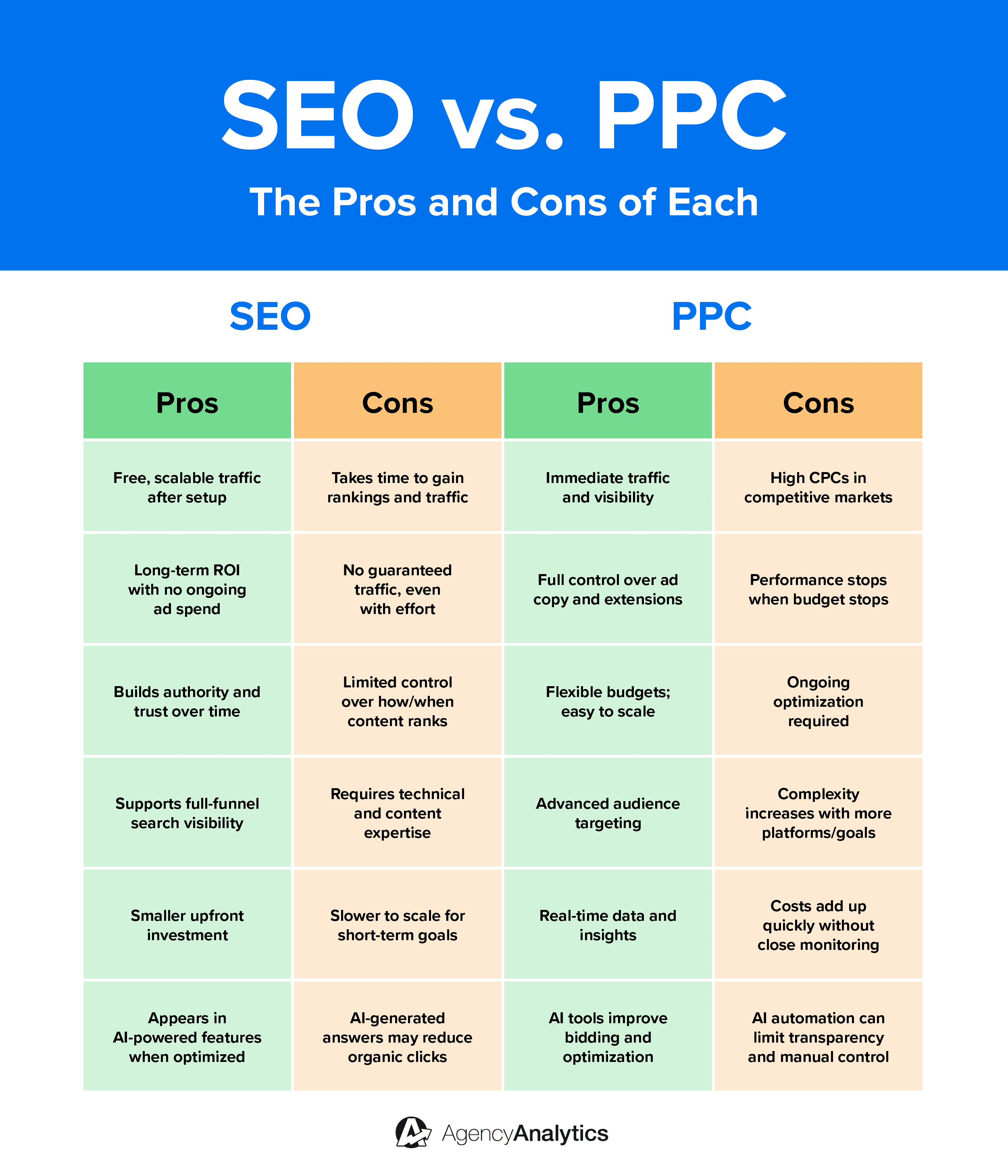
The intersection of SEO and PPC in search engine marketing
SEO builds long-term visibility, while PPC delivers instant traffic. When combined, they form a search strategy that’s scalable, effective, and responsive. Use PPC reporting automation to show paid results alongside SEO—without extra workload.
More specifically, here’s a breakdown of how they work in tandem:
Keyword & conversion insights: PPC campaigns highlight which keywords drive conversions and which messages perform best. These insights help shape SEO content and guide keyword targeting with proven intent.
SERP coverage: Appearing in both paid and organic results increases brand visibility, builds trust, and pushes competitors further down the page. This dual presence leads to stronger click-through potential.
Shared creative testing: A/B testing headlines and CTAs uncovers what resonates with your client’s audience. Use those high-performing messages in SEO titles and meta descriptions to boost organic engagement.
Retargeting SEO traffic: Visitors who arrive through organic search but leave without converting could be re-engaged through PPC remarketing. This follow-up helps bring them back and improves the likelihood of conversion.
Smarter Budget Allocation: As SEO traffic grows steadily, shift PPC spend toward time-sensitive offers, competitive keywords, or new campaigns. This approach ensures each channel plays to its strengths while maximizing overall return.
Together, SEO and PPC create a closed-loop system that improves visibility, performance, and return on investment across the entire search funnel.
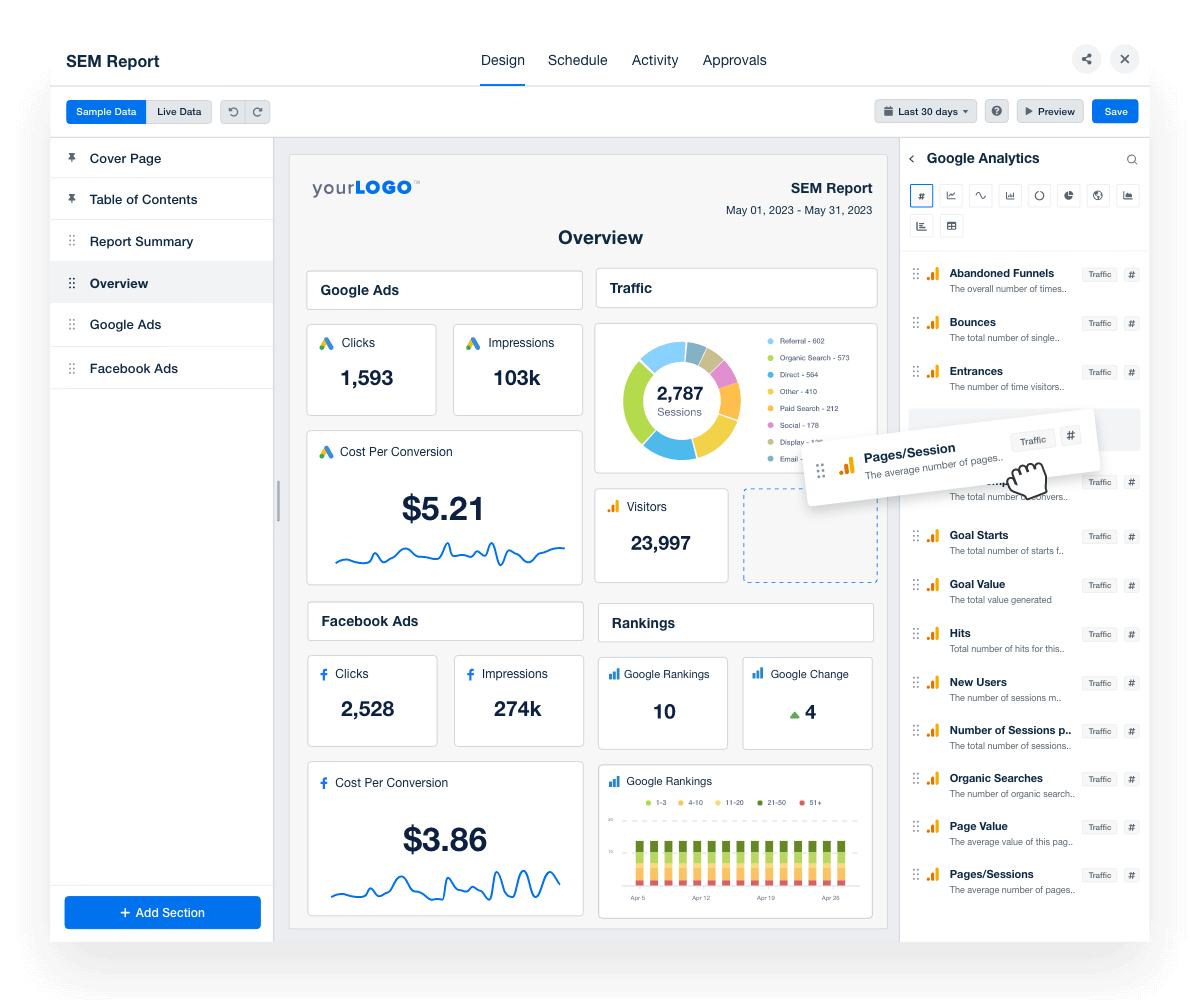
Access SEO and PPC marketing data in one place. Use this pre-built SEM report template to present actionable insights and show clients data-driven results. Try AgencyAnalytics, free for 14 days.
Interesting organic vs. paid search statistics
Curious how marketers are actually using SEO and PPC? Here are some interesting stats to consider:
Owning the first ad position and first organic position can drive 49% of all clicks to a website.
The #1 result in Google's organic search results has an average CTR of 27.6%, which is 10x the CTR of position 10.
The average ROAS for Google Ads is 200%, which translates to earning $2 for every $1 spent.
According to recent CTR by ad platform benchmarks, click-through rates on Google paid search ads are about 2% for all advertisers, but closer to 5% for campaigns run by marketing agencies.
SEO generates more than 10 times the traffic compared to organic social media channels.
Paid search visits are 35% more likely to convert than organic search.
The median Moz Domain Authority rank for a typical SMB website is 19.
The average small to medium-sized business invests 7x more in PPC than they do in SEO.
The average number of ecommerce touchpoints varies by product but can range from 8 to over 20.
Over 52% of marketers are investing in technical SEO updates to their website.
53% of marketers are actively trying to rank for Google Featured Snippets.
Local businesses receive an average of 67 mobile map impressions each month.
21% of consumers use a search engine daily to search for nearby local businesses.
63% of users believe that the top results on the results page are the well-known brands.
A combination of paid and organic results in increased brand recall.
The average marketing agency tracks 45 keywords per client campaign.
Sources: Statista, Google, Ahrefs, Backlinko, WebFX, AgencyAnalytics Client Reporting Benchmarks, and Wordstream. These stats make one thing clear—marketers who align SEO and PPC are more likely to drive measurable results, increase conversions, and outperform competitors in search.
The role of AI in SEO and PPC
AI is reshaping the way marketers plan, execute, and optimize SEO and PPC strategies. From smarter targeting to automated content analysis, here are some detailed ways AI is being incorporated across both channels.
Area | AI in SEO | AI in PPC |
|---|---|---|
Strategy & Planning | Often used to predict search intent, guide content strategies, and inform keyword targeting. | Forecasts campaign performance and recommends optimal budget allocation. |
Content & Creative | Suggests structure, tone, and formatting based on top-performing content. | Generates and tests multiple ad variations (headlines, descriptions) for increased engagement. |
Optimization | Analyzes keyword gaps, technical issues, and SERP features like snippets and FAQs. | Automatically adjusts bids based on real-time signals (e.g., device, time of day, audience intent). |
Technical Analysis | Performs SEO audits to detect crawl errors, mobile issues, and performance bottlenecks. | Flags anomalies in performance data (e.g., spikes in CPC, low CTR) for faster resolution. |
Audience Targeting | Identifies intent-based opportunities for content creation. | Builds and refines audience segments using behavioral and predictive modeling. |
Reporting & Insights | Summarizes performance data and provides optimization recommendations. | Delivers real-time insights into ROAS, CPA, and campaign health with AI-assisted reporting. |
Whether it's streamlining campaign management or surfacing insights faster, AI helps marketers to work smarter, not harder. When used effectively, it enhances organic and paid strategies alike.
SEO vs. PPC: Which is better?
Both SEO and PPC have distinct advantages, and choosing the right one depends on goals, timelines, and budget. As a reference, here are a couple of scenarios, recommended use cases, and the reasons behind them.
Marketing objective / scenario | Recommended approach | Why it works |
|---|---|---|
Promotions and scheduled events | PPC | Delivers immediate visibility and traffic—ideal for time-sensitive campaigns. |
New & innovative products | SEO + PPC | PPC drives instant awareness, while SEO builds long-term discoverability and trust. |
Clients with a short-term exit plan | PPC | Prioritizes fast results and lead generation without waiting on organic search rankings. |
Branding | SEO + PPC | SEO builds authority over time; PPC ensures consistent brand visibility across key searches. |
Local business expansion | SEO | Local SEO boosts map listings, reviews, and regional keyword rankings to support local growth. |
Competitive market | SEO + PPC | Occupying both paid and organic positions increases Google SERP dominance. |
Limited budget | SEO | SEO offers compounding value with lower ongoing costs compared to pay-per-click campaigns. |
Broad target audience | PPC + Paid Social | Paid platforms allow for wide reach and demographic targeting that SEO alone can't deliver quickly. |
Niche markets with specific keywords | SEO | Organic search works well when targeting precise, low-competition keywords with clear intent. |
Establishing trust and credibility | SEO | Organic rankings are perceived as more trustworthy than ads, helping build long-term authority. |
To sum up, if a client wants quick results (and is willing to pay for them), paid search may be the best option. However, an organic search strategy may be a better choice if they are looking for a long-term solution that doesn't require ongoing spending.
With all that said, there’s something worth emphasizing: Two channels are better than one (which brings us to our next section).
SEO and PPC: How they work together
Sure, people will keep debating SEO vs. PPC until the internet shuts down. But we like to think of them like peanut butter and jelly. Each works fine on its own, but together, they’re a classic combo. One builds long-term authority, the other drives instant results.
When used side by side, they make the whole strategy stick–here’s how.
Keyword research
One of the benefits of tracking organic rankings for PPC keywords is that it helps strengthen keyword research. By looking at both organic and paid results, you’ll get a better idea of:
Which terms are worth targeting.
The gaps that your agency could potentially take advantage of.
For example, let's say your client is a professional electrician in Los Angeles who wants to start running paid search campaigns. You've done some initial research and come up with a list of potential keywords, including "electrician Los Angeles," "emergency electrician Los Angeles," and "24-hour electrician Los Angeles".
If you rely solely on keyword research, it may appear that all of these terms are worth targeting through both SEO and PPC.
However, upon reviewing Google Ads data, a different perspective emerges. Although “emergency electrician Los Angeles” shows plenty of organic results, it has few paid ads and a below-average cost per click. This suggests the keyword is less competitive and could offer a cost-effective opportunity to capture targeted traffic.
On the other hand, “24-hour electrician Los Angeles” has lower organic competition, but there are plenty of paid ads. This could indicate that this keyword is quite competitive and could be expensive from a PPC perspective.
However, since the organic keyword difficulty score is lower, this makes it a great candidate for SEO.
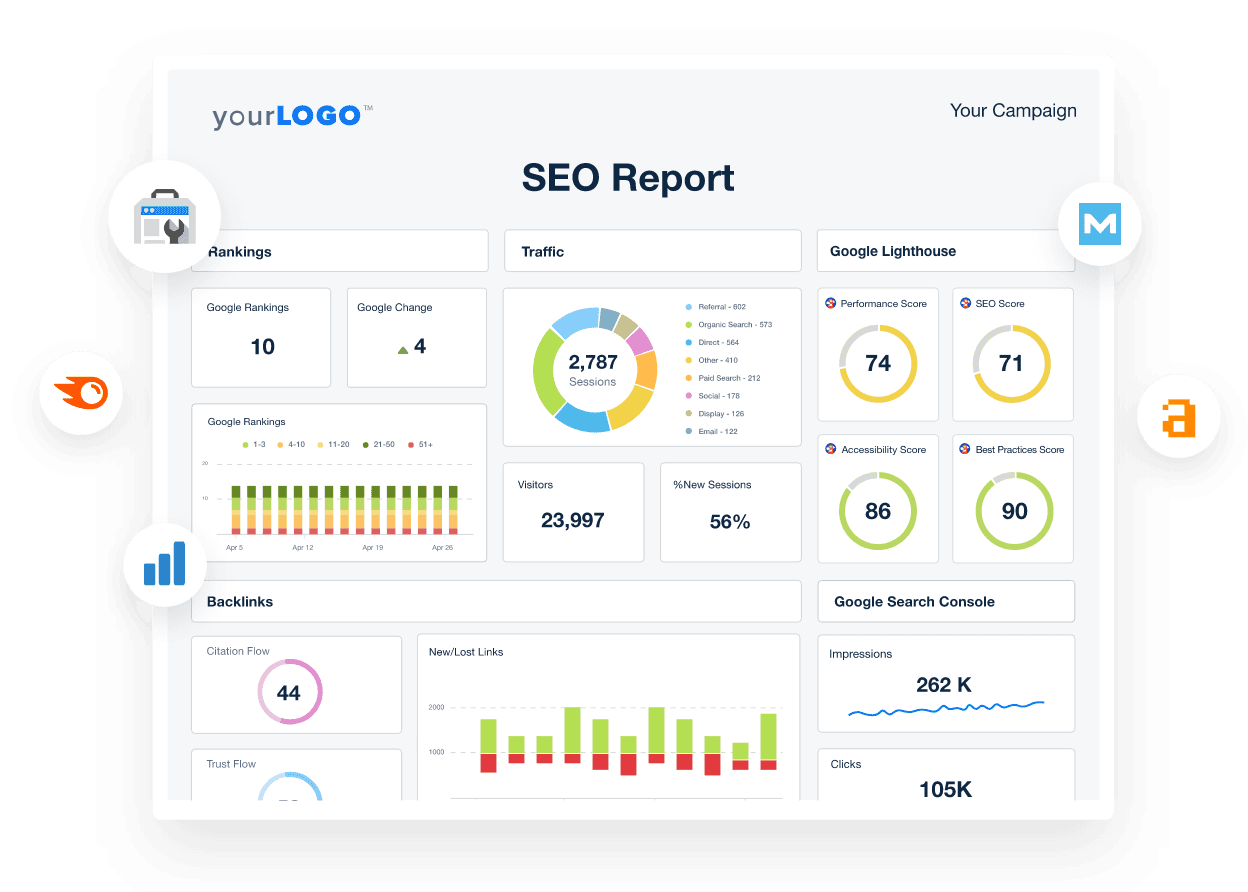
Tracking insights across multiple platforms? Invest in comprehensive SEO reporting software to consolidate it all. Invest in a reporting tool that’s built for scale–try AgencyAnalytics, free for 14 days.
With that insight, it’s easier to strengthen the other side of the strategy—whether that means supporting top-performing PPC keywords with SEO content, or running ads for high-ranking organic terms.
We work to use the data presented from all channels to pivot when needed. As we see specific platforms' performance shifting, we take an overhead look at other channels that might be outperforming. From there, we reallocate budgets and continue to optimize. Without clear data, we're unable to make calculated decisions.
Christopher Marrano, Founder & CEO, Blue Water Marketing
Increased digital footprint
In today’s SERPs, organic listings share space with ads, AI-generated overviews, “People Also Ask” boxes, shopping carousels, map packs, and video results. Therefore, it’s no longer just about ranking #1 organically—it’s about occupying as much screen space as possible.
One of the clearest advantages of combining SEO and PPC is increased visibility on the search engine results page (SERP). Appearing in both paid and organic listings for the same keyword boosts click-through rates, expands your client’s digital footprint, and pushes competitors further down the page.
Wondering what this looks like? Let’s say a client’s paid ad appears at the top of the page. That alone captures prime attention. If they also have an organic result just below—along with an answer in the “People Also Ask” box or a featured image—your client dominates the screen. This layered presence builds trust, improves brand recall, and increases the likelihood of a click.
Quick wins and long-term growth
One of SEO’s biggest challenges is time; it takes patience to see results. But as an agency, clients expect more immediate returns. That’s where paid search comes in.
Smart agencies understand that you need to deliver quick wins. You need low-hanging fruit that will drive clicks, calls, etc. It’s about creating a combination of everything so you can see some results in three months and good results in six months.
Mark Jamieson, Digital Marketing Consultant, WSI eStrategies
Running paid campaigns for the same keywords you're targeting with SEO brings in immediate traffic while organic rankings develop. Tracking both channels shows early PPC results and highlights how paid efforts support long-term SEO growth. This bridges the gap between quick wins and lasting performance.
Budget management
Tracking organic rankings for PPC keywords opens up smart budget optimization opportunities. For example, there’s a chance to:
Reduce spend on high-CPC keywords: If certain keywords have a high cost-per-click and your client already ranks on the first page organically, consider shifting that spend to lower-CPC terms or underperforming areas with greater return potential.
Schedule ads at optimal times: Since CPCs fluctuate by time and day, use paid campaigns during high-converting windows and rely on organic rankings to maintain visibility during off-peak hours.
Target high-potential demographics: While organic search offers less control over geographic targeting, paid ads allow for precision. Use PPC to target high-value regions, and use organic content to explore or expand into new markets at a lower cost.
Balancing paid and SEO efforts this way ensures the budget works harder, driving stronger results without unnecessary spend.
Summary: Integrating SEO and PPC data has never been more important
More than two decades after Google Ads was launched, the SEO vs. PPC debate is still alive, and even more relevant as AI continues to reshape search as we know it.
Both channels have evolved, but each still plays a vital role in a modern marketing strategy. SEO drives long-term, cost-effective growth. PPC delivers immediate visibility and conversion potential. When used together, they create a balanced, high-impact approach that maximizes reach and improves overall search performance.
Whether you’re running cross-channel campaigns or focusing on one specific area, it’s important to have a centralized system for that data. Instead of switching between platforms, relying on glitchy reporting systems, or taking screenshots, invest in an all-in-one solution like AgencyAnalytics.
Gorgeous interface. Simple, elegant, without sacrificing features. And SO MANY features. Plus, integrated marketing. Now we have a single platform to manage and report SEO, SEM, and Social Media.


Use this SEM reporting tool to:
Automatically retrieve SEO analytics data and PPC metrics.
Turn complex numbers into data-rich, intuitive visuals.
Deliver professional, white labeled reports.
Monitor marketing performance across 80+ platforms.
That’s just the start! Generate AI-powered insights about SEM performance, access first-party data benchmarks, and even create a Smart Dashboard in just 11 seconds. Explore everything AgencyAnalytics has to offer–try it free for 14 days.

Written by
Paul Stainton is a digital marketing leader with extensive experience creating brand value through digital transformation, eCommerce strategies, brand strategy, and go-to-market execution.
Read more posts by Paul StaintonSee how 7,000+ marketing agencies help clients win
Free 14-day trial. No credit card required.



